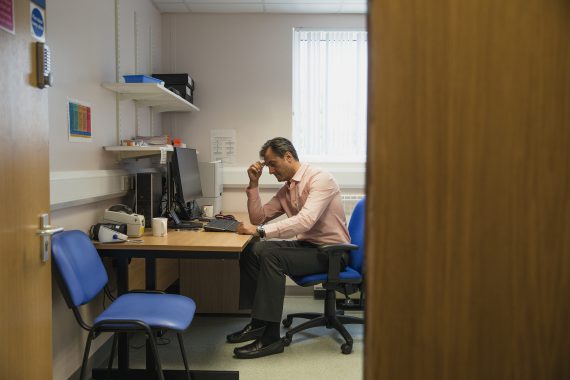A total of 90% of GPs are working beyond their scheduled hours on a weekly basis – up from 79% last year – while more than a third of the profession have cut their clinical hours in the past 12 months, a major GMC report has shown.
The regulator’s annual UK-wide report on the state of medical education and practice warned GPs are at ‘particular’ risk of burnout due to high workloads and the pressurised environment they work in.
Almost one in ten (9%) family doctors have taken a leave of absence in the past 12 months, according to the report, which surveyed 1,079 GPs out of a total of 3,876 doctors between June and July 2019,
In the past year, clinical hours were cut by 36% of GPs, a figure ‘markedly higher than other registration types’, highlighted the report.
A total of 46% of GPs are contracted to work less than full time, a group that is more likely to be more satisfied with their work – and less likely to leave the profession – than those working full-time hours.
The report suggested working less than full time ‘may be a protective factor against burnout’ as 27% of full-time GPs were deemed at ‘high risk’ of burnout, compared with 20% of those on fewer hours.
The GMC’s chief executive warned increased complexity of cases and rising patient demand was driving GPs to cut hours – and that recent boosts to the number of GP trainees would not be enough.
GP leaders have stressed the profession should not be criticised for reducing their clinical hours, a move that can mean they do not leave their jobs altogether.
The regulator’s publication, released today, looked at the challenges and opportunities in primary and secondary care.
It also shows that:
- 65% of GPs work beyond rostered hours every day;
- GPs indicated the highest risk of burnout compared with other register types, with 25% indicating high burnout risk;
- 9% have had to take a leave of absence due to stress in the past year;
- 56% of GPs working less than full time were satisfied in their job, compared with 49% of GPs working full time;
- 9% of GPs working less than full time are considering leaving the profession in the next year, compared with 13% working full time;
- Asked why they were considering reducing their contracted hours, 71% of GPs said their current role was too demanding. Almost half (46%) said the current system presented too many barriers to patient care.
GMC chief executive Charlie Massey said: ‘The clinical work of GPs is changing. They’re seeing more patients, many with complex needs and some who have high expectations of what primary care can do for them.
‘That’s one reason why we’re seeing more GPs choosing to work less than full time, and many planning to reduce their hours in the next 12 months.
‘It means that while there are welcome increases in the number of GPs coming out of specialty training, this is not keeping pace with demand.’
RCGP chair Professor Martin Marshall said: ‘It’s not surprising to see more GPs reducing or planning to reduce the number of clinical hours they work. They shouldn’t be criticised for this – it’s this flexibility in working patterns that general practice offers that makes the job sustainable, so that GPs and our teams can continue to deliver safe care to a million patients a day across the country.
‘Working “full-time” in general practice is simply not doable for many, and this is causing GPs to burn out, or leave the profession earlier than they planned to because they feel they cannot guarantee safe standards of care for their patients. It makes sense that GPs are making choices about their career to safeguard against this.’
Professor Marshall called for more measures to reduce GP workload, boost investment and increase the size of the workforce.
BMA council chair Dr Chaand Nagpaul said: ‘Crucially, as this report notes, exhausted and burnt out doctors, overwhelmed by demand, are struggling to provide the level of care that patients deserve.
‘This is affecting quality and safety of the care that’s being delivered. It’s clear that the impact of the state of the NHS is being felt across the whole profession – from juniors beginning their careers, to experienced hospital doctors and GPs.’
It comes as the number of GP appointments rose to around 30.8m in October, the highest ever recorded in a single month.
Pulse July survey
Take our July 2025 survey to potentially win £1.000 worth of tokens














